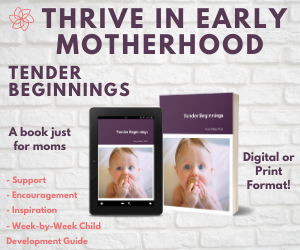Sneak peek: What does the “mirror test” in babies tell us about their self-awareness?
At some point or another, many parents have placed their infant in front of a mirror and wondered if their child could understand that it was their own reflection they were seeing. In the realms of child development and parenting, this is a common question.
Based on the infant’s reaction, most parents realize pretty quickly that their baby doesn’t really understand that it is themselves in the mirror. This raises the question: when do babies and young children begin to develop a sense of self? Child psychologists have used this mirror test for babies in a creative way to help uncover the answer to this question.

When Do Babies Recognize Themselves in the Mirror?
In a classic psychological experiment in the 1970s, researchers took a group of children ages 6 to 24 months and placed a spot of lipstick or rouge on their noses (this is why it’s called the “rouge test”). They then placed the children in front of a mirror (hence the term “mirror test”) to see how they responded. Here’s what they found:
Young infants (age 6-12 months) seem to think the baby in the mirror is another baby. They smile and approach the baby in a friendly way.
Older babies (age 13-24 months) respond with a little more hesitation at this point. Researchers aren’t sure if the children know that the reflection is themselves or whether they still think it is another child.
Toddlers (age 20-24 months) seem to clearly recognize that the reflection in the mirror is their own. The clear sign of this is that while looking in the mirror, they touch the dot of lipstick on their own nose instead of touching the mirror.
Related reading: Understanding Toddler Growth Spurts (includes a printable guide for what behavior to expect from ages 2-6)
Of course, the results of this mirror test for babies are not clear-cut. Just because a toddler recognizes themselves in the mirror doesn’t necessarily mean they have a complete mental concept of themselves. Visual recognition may not completely correlate to mental self-perception. Other, more complex studies would have to be conducted to determine when the mental concept of the self emerges.
In some ways, our self-concept is developing for most of our lives. Remember how your sense of self changed during adolescence or when you became a parent? No doubt, your full self-concept continues to change throughout life. But maybe it all starts with this simple recognition in toddlerhood that you are that person in the mirror. It’s kind of lovely to consider.
Want to understand more about your new baby? And how to thrive as a new mom? Download my new book!
Interestingly, animal studies have shown that some of the more intelligent mammals, such as elephants, dolphins, and chimpanzees, also recognize themselves in the mirror. Does this mean these animals have a mental concept of “the self”? Who knows? It seems unlikely, but maybe so. All these animals have fairly complex social systems, so maybe they do have a concept of self.
**This post contains affiliate links. When purchasing items through these links, I received a small commission (at no added cost to you.) Thanks!
Could you tell when your child started to develop a concept of themselves? How could you tell?
Sign up for my Substack newsletter to learn more about child development and parenting!



Leave a Reply